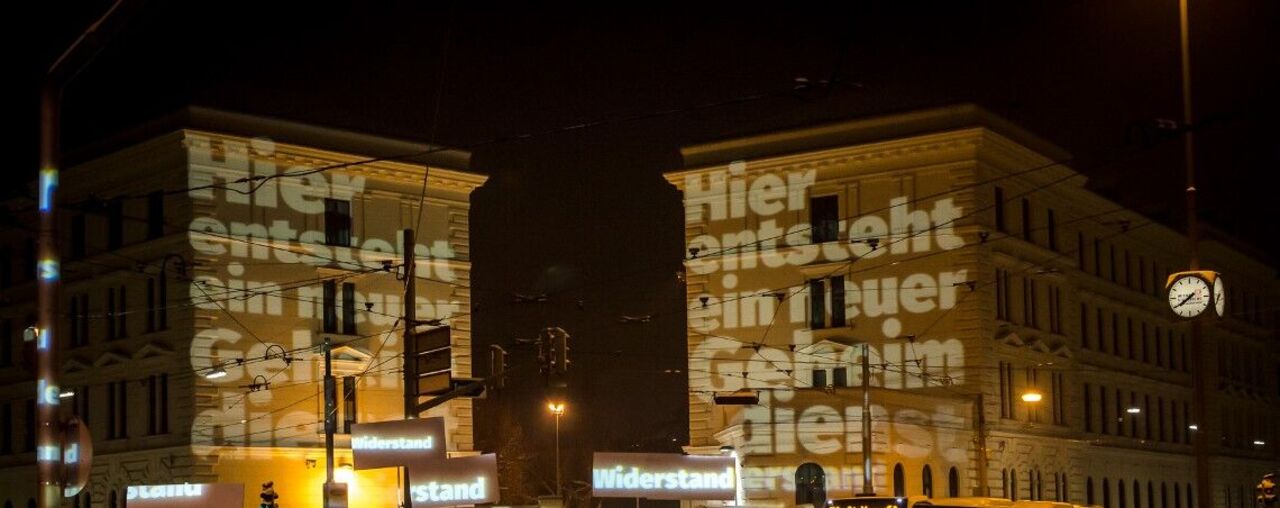On July 1st 2016, a new domestic secret service with extensive powers and authorities was established. The basis for this is the Polizeiliche Staatsschutzgesetz (PStSG). From the beginning we put up strong resistance against this law and we will continue to do so.
The first draft of the law, which was presented in the beginning of March 2015 by the ministry of interior, was very alarming. The measures of surveillance included in it were supposed to be available, even without the occurrence of a punishable offence and without any control by independent judges. Since the first draft, some things were improved and some things were softened or even slightly contained. Yet, this law allows extensive measures of surveillance in its final form, and it does not include sufficient protection of civil rights.
With this new law, entire social groups become targets of the domestic secret service. Football fans, animal rights activists, and religious minorities can all be put under surveillance due to the ambiguous term "Gruppierung" (grouping). The term "verfassungsgefährdender Angriff" (attack endangering the constitution) is insufficiently defined. Thus, no specific suspicion or cause is needed to employ surveillance measures. This means that a powerful, non-transparent, and uncontrolled police authority with the surveillance powers of a secret service has been created.
In the course of the year 2015 there were many discussions about this undertaking, thanks to our juristic analyses of all four presented drafts and many public actions. Sadly, neither the 30,078 signatures on our petition website, www.staatsschutz.at nor our numerous statements led to a law that is compatible with our basic rights, even though several significant improvements on the original draft were achieved.
This is why we composed a constitutional complaint ("Drittelbeschwerde") ordered by the Green Party and the Liberal Party, which was filed at the Austrian Constitutional Court (VfGH) at the end of June. It is yet unknown when the court proceedings will take place. We'll keep you posted!
Our main points of criticism
- A new uncontrollable domestic secret service is being established in Austria
- Surveillance without control by judges
- Extremely long periods for storing the collected data
- Surveillance of entire "groupings"
- Surveillance without any punishable offence
- Unlimited internet surveillance
- Introduction of paid police informers
- Lack of evaluation of existing surveillance measures
Our five demands
The signatories of the petition against the PStSG support our demands. These demands were not taken into account when the drafts were adapted and thus remain unchanged.
- Fact-based security policies – The PStSG has to return to square one and must be created after and according to a comprehensive evaluation of the current surveillance situation, of statistics of police investigations, and of a fact-based analysis of the security requirements. The government may violate basic rights only when it can prove that the undertaking is necessary and proportionate.
- Clear separation of police and secret services – The state protection must not be a police authority and have, at the same time, the surveillance powers and authorities of a secret service. Unambiguous responsibilities are vital.
- No repression against the civil societies, journalists, and whistle blowers – The tasks of the state protection must not include minor offences. The definition of "verfassungsgefährdender Angriff" (attack endangering the constitution) must be clearly delineated and only contain severe crimes. There must not be an infringement on basic rights like the right to demonstrate and the freedom of the press.
- Strong legal protection, no "pre-crime" – For every measure of surveillance there must be specific suspicions. The proportionality of the measure must be documented in written form and approved by a judge. The control by the parliament must be extended and the transparency of the activities of the relevant authorities must be increased.
- No paid police informers – Experiences in Austria and in many other countries show clearly that having police informers often leads to difficulties in ensuing trials. The use of paid informers has also led to scandals. Austria should learn from these experiences instead of repeating past mistakes. The use of unpaid informers has to be clearly regulated and must be compatible with the court proceedings.
More information about the State Protection Act is available at www.staatsschutz.at.
Press mentions on this topic
| Title | Date | Publication | Publication details | Type of publication | Mentioned |
|---|---|---|---|---|---|
| 12 benchmarks for the reform and oversight of intelligence services in Austria | 02/10/2021 | edri.org | Web | yes | |
| Dokustelle Islamfeindlichkeit sieht in Straftatbestand politischer Islam "Gesinnungsstrafrecht" | 11/25/2020 | derStandard.at | Web | yes | |
| #Substral über epicenter.works | 06/11/2019 | Radio Helsinki | Substral | Radio | yes |
| Netzpolitik: Schlechtpunkte für Regierung | 08/23/2018 | Die Furche | Ausgabe 34, Seite 10 | yes | |
| Staatsschutzgesetz: FPÖ-Grün-Antrag vor VfGH gescheitert | 11/30/2017 | ORF | Web | yes |



